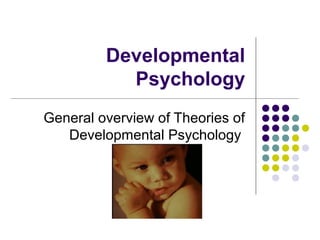
General overview of theories of developmental psych
- 1. Developmental Psychology General overview of Theories of Developmental Psychology
- 2. Domains of Development 1. Physical development -changes in body size, proportions, appearance, brain development, perceptual and motor capacities, & physical health. 2. Cognitive development –thought processes, intellectual abilities (attention, memory, problem solving, imagination, creativity), & capacity to represent the world through language. 3. Emotional and Social development – emotional expression, feelings, interpersonal skills, self-understanding, & emotional regulation.
- 3. Periods of Development 1. The Prenatal Period (conception-to-birth) Rapid change occurs during which a one-celled organism is transformed into a human baby. 2. Infancy and toddler hood (birth to 2 years) Rapid changes in physiology, perceptual & motor capacities, language acquisition, and emotional development. 3. Early childhood (2 to 6 yrs). Child’s body grows, motor skills become more complex and refined, behavior is more self-controlled and sufficient. Child engages in imaginative play, obtains greater autonomy, develops fluent language and learns morals.
- 4. Periods of Development contd. 1. Middle childhood (6 to 11 yrs). Children master reading, grammar, mathematics,and other academics. They become more independent, responsible, their thought processes become more logical, athletic ability improves, and sense of self becomes more advanced. 2. Adolescence (11 to 20 yrs). Thought processes becomes more abstract, sexual maturity is reached, interest in preparation for college or work becomes salient. Emotion regulation changing.
- 5. Theories of Development ThePsychodynamic View (Freud – 1856- 1939) Popular- 1930s & 1940s. Childrenmove through a series of stages in which they must resolve unconscious conflicts between biological drives and societal expectations. Theunsuccessful completion of one of these stages led to development of dysfunctional or abnormal behavior.
- 6. Structures of Mind 1. Id- present from birth this structure is unconscious and seeks to gratify our most basic urges: hunger, thirst, elimination of waste, and sex. (“I want” of our personality). 2. Ego- is primarily conscious, and tries to satisfy the demands of the id, without compromising the norms of society. The ego works according to the reality principle. 3. Super-ego: the last structure to develop, it is our moral center, it tells us what is right and wrong.
- 7. Psychosexual Stages of Development 1. Oral (0-1 year) –infants gains satisfaction from oral stimulation (sucking, licking). 2. Anal (second year of life)- Child’s main source of libidinous pleasure comes from passing and retaining feces. 3. Phallic (3 to 5)- child’s main source of gratification results from stimulation of the genitals. 4. Latency (6-12) - during this stage sexual impulses are dormant. 5. Genital (young adulthood)- During this stage the child develops heterosexual interests.
- 8. Learning Theory/Behaviorism Learning is a relatively permanent change brought about by knowledge and/or experience. Popular- 1940s-1960 Human development is influenced by environmental factors. Behaviorism - focuses on observable behaviors, rather than on consciousness.
- 9. Types of Learning Classical condition: reflexive learning by association Pavlov’s study: Step 1: Meat Powder (UCS)---------Salivation (UCR) Step 2: Bell (CS) -------- ---Meat Powder (UCS)--Salivation (UCR) (pair bell with meat) Step 3: Bell (CS)--------------------Salivation (CR)
- 10. Operant conditioning (B.F. Skinner) Operant conditioning – behavior may be learned or extinguished through use of reinforcers (rewards) or punishments. Positive Reinforcement E.g., a good grade received after studying for an exam Negative Reinforcement E.g., smoking behavior increases to reduce the aversive sensations associated with a nicotine fit.
- 11. Social Learning Theory Modeling (Albert Bandura) We learn the consequences of given actions by observing what happens to others. Observing whether others are reinforced or punished for given behaviors may influence the probability that we will produce such behaviors. Added benefit: We don’t have to be punished to learn “what-not-to-do.”
- 12. Cognitive Developmental Theory Piaget’s theory (1960s) Children actively construct knowledge as they manipulate and explore their world, & their cognitive development takes place in stages. Argued that children adapt to their surroundings. Children don’t come out with blank slate, but with methods for acquiring knowledge.
- 13. Processes of Change According to Piaget 2 complementary cognitive processes play a major role in promoting change and increase children’s cognitive understanding of their world. Assimilation is the process by which children absorb new information in with their current framework (schema). Accommodation is the process by which children modify existing knowledge structures based on incorporating new information.
- 14. Piaget’s Stages of Cognitive Development Sensorimotor (birth to 2 yrs)- infants acquire knowledge by “acting” on their environment, using their senses and movements to explore the world. Preoperational (2-7 yrs)- preschool-age children acquire advanced language skills and start to think using symbols. Concrete operational (7-11 yrs)- Children’s reasoning becomes logical. They learn to logically organize concepts. They learn conservation of liquids and solids. Formal operational (11+ yrs)-Abstract thinking comes on-line, problem solving ability improves. ss
